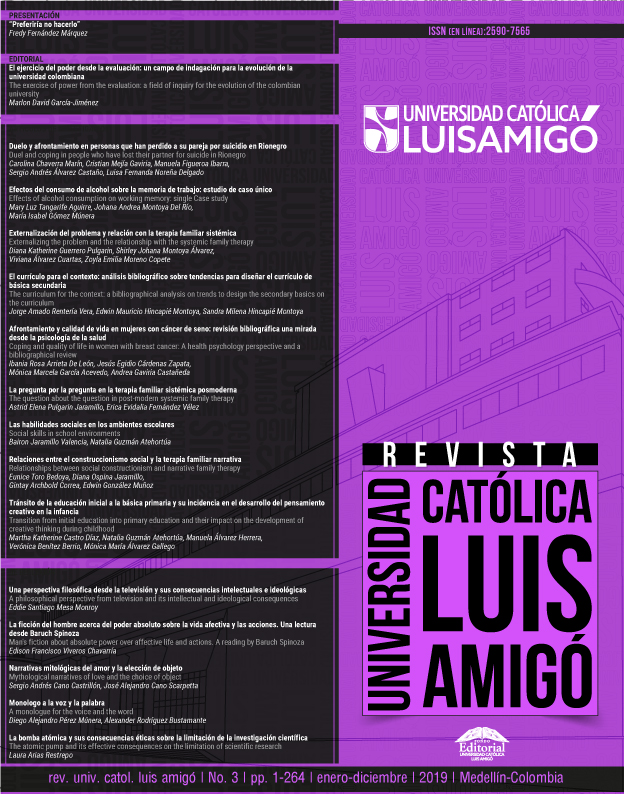The exercise of power from the evaluation: a field of inquiry for the evolution of the colombian university
DOI:
https://doi.org/10.21501/25907565.3256Abstract
Historically, the classic space of formation (the classroom) has been exposed to the learning of content through the use of daily semantic memory, prevailing then the traditional learning about meaningful learning (De Posada, 2002, p. 101), the reflection in relation to these contents has been practically null due to obstacles, such as the use of simplistic methods by the teacher for the learning of concepts with a higher complexity rank and also the apathy from students to engage with the autonomous development of knowledge, a situation that finds an explanation for the addiction from the student to his/her previous ideas, the lack of motivation and positive attitude and the lack on empathy between the student and the teacher (p. 102).Downloads
References
Bachelard, G. (2000). La formación del espíritu científico (Vigesimotercera ed.). (J. Babini, Trad.). México: Siglo XXI.
Bourke, T., Ryan, M., & Lloyd, M. (2016). The discursive positioning of graduating teachers in accreditation of teacher education programs. Teaching and Teacher Education, 53, 1-9. DOI: 10.1016/j.tate.2015.09.009
Chi-Jung, T., & Chuan-Ta, C. (2012). Teaching culture in Taiwan’s EFL classroom. Procedia-Social and Behavioral Sciences, 47, 1843–1846. DOI: https://doi.org/10.1016/j.sbspro.2012.06.910
Deleuze, G. (2013). El saber. Curso sobre Foucault. (P. Ires, & S. Puente, Trads.). Buenos Aires, Argentina: Cactus.
De Posada, J. M. (2002). Memoria, cambio conceptual y aprendizaje de las ciencias. Revista Electrónica de Enseñanza de las Ciencias, 01(2), 92-113. Recuperado de http://reec.uvigo.es/volumenes/volumen1/REEC_1_2_4.pdf
Foucault, M. (1996). La verdad y las formas jurídicas. Barcelona, España: Gidesa.
Foucault, M. (2009). El gobierno de sí y de los otros. (H. Pons, Trad.). Buenos Aires, Argentina: Fondo de Cultura Económica.
Giuria, P., Munari, F., Scandura, A., & Toschi, L. (2018). The strategic orientation of universities in knowledge transfer activities. Technological Forecasting & Social Change, 138, 261-278. DOI: https://doi.org/10.1016/j.techfore.2018.09.030
Hernández Méndez, G., y Reyes Cruz, M. D. (2011). Los alumnos: adversarios en las relaciones de poder dentro del aula. Perfiles educativos, 33(133), 162-173. Recuperado de http://www.scielo.org.mx/scielo.php?script=sci_arttext&pid=S0185-26982011000300010
Ottena, S., Bleiler-Baxterb, S., & Engledowl, C. (2017). Authority and whole-class proving in high school geometry: The case of Ms. Finley. Journal of Mathematical Behavior, (46), 112–127. DOI: https://doi.org/10.1016/j.jmathb.2017.04.002
Padilla Carmona, M. T., Gil Flores, J., Rodríguez Santero, J., Torres Gordillo, J. J., y Clares López, J. (2010). Evaluando el sistema de evaluación del aprendizaje universitario: análisis documental aplicado al caso de la Universidad de Sevilla. Revista Iberoamericana de Educación, 53(3), 2-14. Recuperado de https://idus.us.es/xmlui/handle/11441/23138
Ramos-Vidal, I. (2016). Popularidad y relaciones entre iguales en el aula: un estudio prospectivo. Psicología Educativa 22(2), 113–124. DOI: https://doi.org/10.1016/j.pse.2015.12.001
Sánchez García, A. G. (2005). La relación maestro-alumno: ejercicio del poder y saber en el aula universitaria. Educación y Desarrollo 4, 21-27. Recuperado de http://www.cucs.udg.mx/revistas/edu_desarrollo/anteriores/4/004_Sanchez.pdf
Torres, M. F., y Cárdenas, E. J. (2010). ¿Qué y cómo se ha investigado sobre la evaluación de los aprendizajes en los últimos cinco años? Estado del arte de las investigaciones (2005 – 2010). Enunciación, 15(1), 141-156. DOI: https://doi.org/10.14483/22486798.3109
Yee, S., Boyle, J., Yi-Yin, K., & Bleiler-Baxter, S. (2018). Effects of constructing, critiquing, and revising arguments within university classrooms. Journal of Mathematical Behavior, 49, 145-162. DOI: https://doi.org/10.1016/j.jmathb.2017.11.009
Downloads
Published
How to Cite
Issue
Section
License
PROPIEDAD INTELECTUAL
Los autores son moral y legalmente responsables del contenido de sus artículos, así como del respeto a los derechos de autor. Por lo tanto, éstos no comprometen en ningún sentido a la Universidad Católica Luis Amigó.
La reproducción de los artículos se regirá conforme a lo descrito en http://creativecommons.org/licenses/by-nc-sa/4.0/

